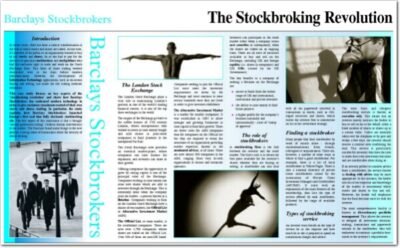
In recent years, there has been a radical transformation in the way in which stocks and shares are traded. At one time, if a member of the public or an organisation wanted to buy or sell stocks and shares, he or she had to pay for the services of specialist stockbrokers and stockjobbers who had the exclusive right to trade and work on the Stock Exchange floor. This form of share trading worked reasonably well in the days before modern communications. However, the development of Information Technology applications, such as on-screen buying and selling, has made the old trading methods redundant.
This case study focuses on key aspects of the ‘stockbroking revolution’ and shows how Barclays Stockbrokers has embraced modern technology in order to give customers maximum control of their own stocks and shares trading. In particular, the study explains how Barclays Stockbrokers launched Europe’s first real time fully electronic stockbroking site. The key aspect of this innovation is that it brought ‘second generation trading’ (without human intervention) to the market. The Barclays brand name brings to the new product a strong sense of reassurance about the security of online dealing.
The London Stock Exchange
The London Stock Exchange plays a vital role in maintaining London’s position as one of the world’s leading financial centres. It is one of the top three exchanges in the world. The origins of the Exchange go back to the coffee houses of 17th century London, where entrepreneurs who wished to invest or raise money bought and sold shares in joint-stock companies to fund journeys to the unexplored Far East.
The Stock Exchange now provides an essential market-place, where companies can raise finance for expansion, and investors can share in their growth. Offering companies the opportunity to grow by raising capital is one of the principal roles of the Exchange. Companies wishing to raise money can issue new shares which are sold to investors through the Exchange. This is commonly done when the company joins the market – a process known as a flotation. Companies wishing to float on the London Stock Exchange have a choice of two markets, the Official List or Alternative Investment Market (AIM).
The Official List, or main market, is for established companies. There are now over 2,700 companies whose shares are traded on the Official List. Over 500 of these are non-UK based. Companies seeking to join the Official List must meet the necessary requirements set down by the Exchange and must continue to meet certain standards once they are listed in order to give investors confidence.
The Alternative Investment Market is a market for smaller companies. It was established in 1995 to allow younger and growing businesses to raise capital to fund their growth. There are fewer rules for AIM companies than for companies on the Official list but they are required to retain the assistance of an organisation providing market expertise, known as the nominated adviser, at all times. There are now almost 300 companies in the AIM, ranging from very hi-tech organisations to leisure and restaurant operators.
Investors can participate in the stock market either when a company issues new securities or subsequently, when the shares are traded on an ongoing basis. There are all sorts of securities available to buy and sell on the Exchange, including UK and foreign equities (i.e. shares in companies) and UK Gilts (issued by the UK Government). The key benefits to a company of seeking a flotation on the Exchange are:
- access to funds from the widest range of UK and international, institutional and private investors
- the ability to raise money to fund future projects
- a higher profile for the company’s business nationally and internationally – a sort of ‘stamp of approval’.
The role of stockbrokers

A stockbroking firm is the link between the investor and the stock market. The firm’s role is to obtain the best price available for the investor’s shares whether they are buying or selling. A stockbroker can also deal with all the paperwork involved in transactions in stocks, such as Giltedged securities and shares, which leaves the investor free to concentrate on his or her investment strategy.
Finding a stockbroker
Many people find their stockbroker by word of mouth alone – through recommendations from friends, colleagues or acquaintances. There are, however, a number of other ways in which to find a good stockbroker. For example, there is a list of local stockbrokers in Yellow Pages. There is also a national directory of private client stockbrokers issued by the Association of Private Client Investment Managers and Stockbrokers (APCIMS). It starts with an explanation of the main features of the membership, then lists the type of service offered by each stockbroker, followed by the range of available products.
Types of service

An investor must decide on the type of service he or she requires and how much he or she is prepared to spend on commission charges and advice. The most basic and cheapest stockbroking service is known as execution only. This means that an investor merely instructs the broker to buy or sell on his or her behalf, either a fixed number of shares or shares up to a certain value. Orders are normally taken over the telephone or by post and within a few days, the investor should receive a contract note confirming the deal. This service is particularly suitable for investors who have the time to make their own investment decisions and are comfortable about doing so.
If an investor prefers to consider advice from a stockbroker, the service known as dealing with advice may be more appropriate. In this instance, the broker uses his or her expertise and knowledge of the market to recommend which stocks and shares to buy and sell. However, the broker will emphasise that the final decision must lie with the investor. The most comprehensive facility is known as discretionary portfolio management. This allows the investor to delegate all investment decision making, transactions and paperwork entirely to the stockbroker, who will endeavour to construct a portfolio best suited to the investor’s requirements.
Barclays Stockbrokers
Barclays Stockbrokers is the UK’s largest retail execution-only broker, providing both certificated and nominee services. It also provides advisory and investment management services. Personal Equity Plans (PEPs) are also offered, enabling clients to shelter £9,000 of their portfolio, every year, from the effects of income and capital gains tax. Barclays Stockbrokers administers corporate share dealing services and a range of corporate PEPs on behalf of the shareholders and employees of many well-known ‘blue chip’ UK companies.
Current modes of buying/selling
The principal method of trading is by telephone. For example, Barclays Stockbrokers has a service known as ShareDeal which is ideal for the occasional transaction or for those frequent traders who prefer to hold their own certificates. A client can use the scheme simply by calling the local rate ShareDeal line and telling a stockbroker what he or she wants to buy or sell. The transaction is completed in a couple of minutes and the client is sent a contract note confirming the deal and advising them how to settle the transaction. Clients can also buy and sell in this way by using the post.
Internet stockbroking

Barclays Stockbrokers is currently piloting the UK’s first real time, fully electronic broking site. The site will be accessible to anyone in the world with access to the World Wide Web. The registration and dealing service, however, is limited to people who are resident in the UK and over the age of 18 years. Clients will be required to complete various checks and provided they meet with certain criteria, they will then be allocated an Internet ID and a digital certificate that will be embedded in their browser. Clients are then able to deal during Stock Exchange opening times (9am to 4.30pm Monday to Friday, excluding Bank Holidays ) in UK equities only. Barclays Internet service will stand out from its competitors because it has a series of Unique Selling Propositions (USPs). For example:
- It will be the first real time on-line trading service on the Internet – differing from other sites which are simply a message service.
- Price will be confirmed by the user as they are on the Net.
- The service is very user-friendly and can be customised by the client.
- The service has the highest levels of security available from any stockbroker.
Under the first development phase of the new scheme, clients will be able to take advantage of the following services:
Execution-only dealing
Registered clients will be allocated an Internet account for share dealing. They can then access the dealing screen and input details of their buy or sell order. Barclays Stockbrokers then quotes a firm dealing price to the client on-line, along with all charges and the net consideration. The client will have a period of 15 seconds to accept the price and confirm that he or she wishes to carry out the transaction. There will be on-screen confirmation of the bargain details, effectively an on-line contract note.
New issues and marketing information (BrochureWare)
Barclays Stockbrokers will be publishing facts and information on current new issues which clients can review.
This facility will provide information on Barclays Stockbrokers’ Internet services, as well as all other services and products offered by Barclays Stockbrokers.
Making the decision to launch the new Internet service

The move by Barclays Stockbrokers into Internet stockbroking is a logical step based on sound research. Developing a new product idea must always be based on intensive research and a clear understanding of future developments. There are a number of key factors which support the decision to move into Internet stockbroking. These include:
- The wide-scale growth in the number of households with access to the Internet in this country and overseas. World-wide Internet users, currently over 60 million, are expected to rise to 200m by the year 2000. In the UK, current estimates show 2 million Internet users.
- The strong correlation between the existing audience of Internet users and households already using Stock Exchange services.
- The growth in the number of people buying and selling shares on the Stock Exchange.
- The successful development of similar services in the United States and Japan.
- The potential threat of rivals starting up a similar service in this country.
Evidence from the research clearly shows that the time is right to develop the new Internet service. It is very much a consumer-driven initiative. In simple terms, there are a lot of existing and new customers who use the Internet as a means of buying and selling financial and other goods and services. Consumers seek the most convenient quality services. Having instant access to a stocks and shares trading service via their home computer is, therefore, a tremendous benefit. The speed and accuracy of Internet transactions also provides a unique opportunity for product improvement. It is a ‘stockbroking revolution’.
Getting the message across
In launching the new Internet service, it will be important to promote the main selling points and benefits. The message is simple:
‘Barclays Stockbrokers real time online trading – is the first of its kind in the UK; your price is confirmed as you are on the Net. It is not a message service like other stockbroking sites. The service is easy to use, has an attractive layout and interface, and is secure.’

One of the key aspects of launching the new Internet service to the UK financial press is to invite journalists and customers to try it out. Demonstrations will include buying a share and then selling it a few moments later in order to show how simple and effective the system is. The integrity of the product will be illustrated by giving a brief tour of the systems and safeguards in use and by offering comprehensive technical and security details to journalists.
Taking Internet share dealing forward
Internet share dealing will put the customer in charge and provide the client with a means of rapidly adjusting his or her portfolio of shares in order to maximise returns. The simplicity of the product is a major advantage, coupled with the strength and security of the Barclays master brand.
Conclusion
The Internet is now driving the pace of change in international financial markets. This case study shows how Barclays Stockbrokers is leading the ‘stockbroking revolution’ with the launch of its electronic stockbroking site.
 The stockbroking revolution (PDF)
The stockbroking revolution (PDF) 